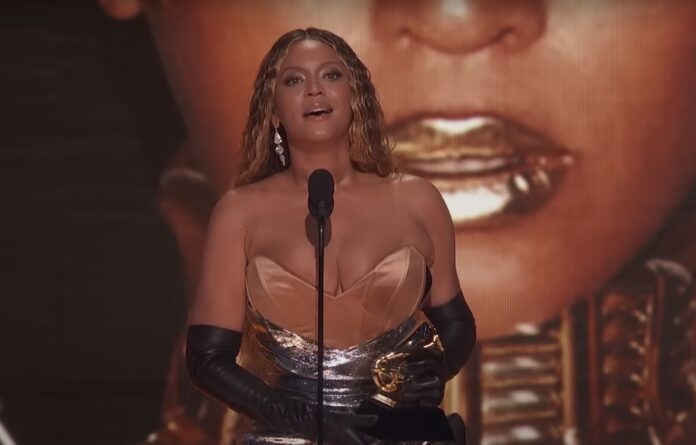America still enjoys, no, adores, seeing big stars win big awards, then give big speeches about winning big awards while looking stunning, and then put on spectacular musical performances. This past Sunday night at the 65th Grammy Awards proved it.
With the broadcast attracting 12.4 million viewers, it was a three-year high for CBS. That’s lower than pre-pandemic numbers, but it’s still the most-watched show on television. Well, besides sporting events. (Be on alert Super Bowl Sunday for the distinct lack of crypto ads, replaced by always profitable and popular alcohol adverts.)
The viewer numbers represent a 30% increase over the 9.59 million people who watched the 2022 awards show. But there’s something else afoot here.
America, high off the Bad Bunny opening with an all-Spanish Caribbean carnival (a jolting celebration of consequential Latin music root forms that put most attendees on stun, except Taylor Swift), got to gawk as the aforementioned stars, plus Harry Styles, Lizzo, Adele, Beyoncé, Brandi Carlile, Kendrick Lamar, Rosalía, Wille Freakin Nelson, Bonnie Rait, and Steve Lacy take home hardware. All on the same night.
It was network television’s version of Prestige TV: Big Stars equal Big Numbers. Note to the Oscars, make that ceremony slap-free so Tom Cruise can post up and drive those broadcast statistics into the Top Gun airspace.
But let’s chop through the slaw. It’s wise to have a host who wants to host, modernizing what previous emcees of the event (LL Cool J and Billy Crystal) did as ambassadors of that night.
Trevor Noah—cringe or not, your mileage may vary—wanted to be in that room, introducing Adele to The Rock, announcing Lizzo’s performance at “Bad Bitch O’clock,” assuring us all that he’d rather keep the train running than derail it. Unlike Jerrod Carmichael, who I enjoy at times—but when Carmichael announced that he accepted a Golden Globes emceeing gig solely for the $500,000 fee it didn’t really read as performer-diplomat to your roomful room of half-buzzed stars. (Yes, we know the Golden Globes are evil, but still.)
On this site, however, the Grammys had their dragons to slay: Making amends with their less-than-formidable treatment of hip-hop and officially making good with Beyonce, the Queen of Pop.
Help us save local journalism!
Every tax-deductible donation helps us grow to cover the issues that mean the most to our community. Become a 48 Hills Hero and support the only daily progressive news source in the Bay Area.
Last thing first. You have artists like Lizzo, who told Bey during her acceptance of Record of The Year, “Thank you so much, you clearly are the artist of our lives.” And Adele who won Album of the Year in 2017 over Beyoncé, speaking everyone’s thought bubble: “I can’t possibly accept this award. I’m very humbled . . . but the artist of my life is Beyoncé. The Lemonade album was so monumental.”
Even Harry Styles looked quizzical after winning 2023’s climactic award: Album of the Year, for Harry’s House. Straight to the credibility playbook he went. “I think, on nights like tonight, it’s obviously so important for us to remember there’s no such thing as ‘best in music.’”
Here you have it three times, three artists politely talking to the Grammys: “Ya’all messed up again and I don’t want that smoke. Lemme give flowers.”
Bey was late for collecting the award for Best R&B Song “Cuff It,” but she was present for making history by taking home Best Dance/Electronic Album, officially the first Black woman to do so, despite Black women dominating house music before the Grammys finally got down with Frankie Knuckles. (Bonobo, nominated in this category, it would not be your night, tonite.)
Eventually, Beyoncé, would break the record and become the winningest artist in Grammy history, but it was her peers, not The Recording Academy, shouting it, beaming with delight, and showering her with statistical accolades.
In terms of hip-hop’s 50th anniversary and the academy’s participation in the celebration, they did plant a flag.
The Grammys presented Dr. Dre with the inaugural Global Impact Award, bearing his name, and created in collaboration with the Recording Academy’s Black Music Collective, which “recognizes the contributors, creatives, and professionals with a proven track record of uplifting Black music.”
This comes almost a year after a Dr. Dre-led Super Bowl Halftime Show drew 29 million US viewers, with performances by Dr. Dre, Snoop Dogg, Kendrick Lamar, Eminem, Mary J. Blige, and 50 Cent.
So with those figures circulating in The Cloud, Questlove was tapped to co-curate a performance to honor the 50th anniversary of hip-hop’s beginnings, and adroitly, the performance served as the proper mid-show energy boost many did not see coming.
In the wrong hands, this performance could have been a snoring paint-by-numbers “my era is better than yours” pile-up. But with Questlove at the helm, the Bat Signal went up, and The Culture got to work.
With MC Lyte an official Grammy announcer all nite, LL Cool J introduced and performed in the segment alongside Black Thought at the top, with a who’s who of performers including the most exquisite lemonade makers of all time, such as Ice-T, Too-Short, Queen Latifah, De La Soul, Missy Elliot, Big Boi, Public Enemy, Salt N Pepa, Rakim, Busta Rhymes… to names a few. This patchwork of Black excellence administered and cataloged our collective American Songbook, one that’s still evolving, into sharp focus, despite the Academy’s foggy dealings with it in the past.
Much like the 30th-anniversary reissue of To Whom It May Concern by LA foundational rap group Freestyle Fellowship receiving a nomination for Best Historical Album, 2023 was the invitation Hip-hop had been waiting for from the Grammys for decades.
To quote the smoking performance by Stevie Wonder and Chris Stapleton (a display on how rock, funk, blues, and country share the same genes) The Grammys may be reaching for a “Higher Ground,” but it’s the consumers who will always identify “perfection.”






